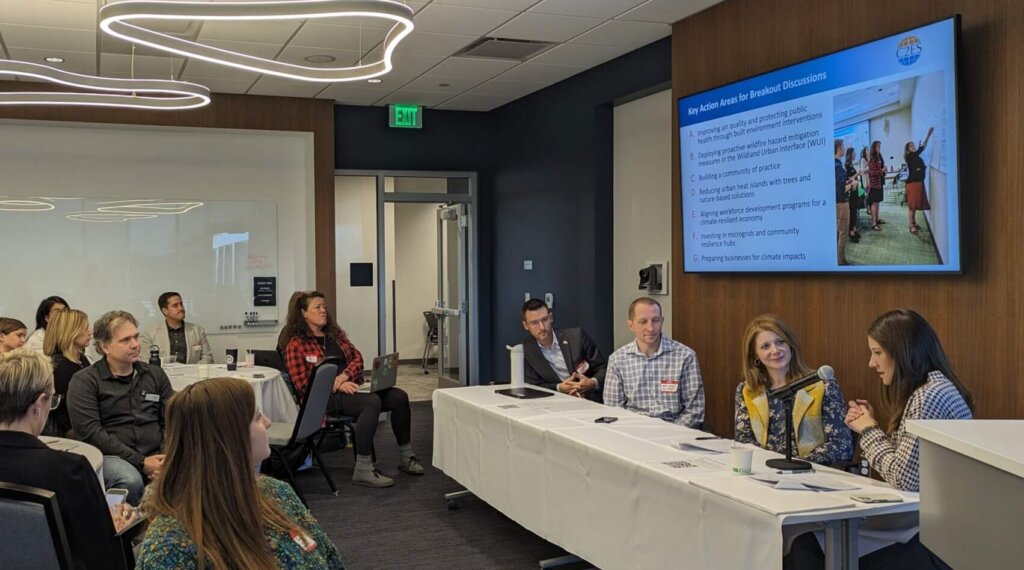Connecting public, private and federal leaders for climate-ready communities


Connecting public, private and federal leaders for climate-ready communities
The Climate Resilient Communities Accelerator supports neighboring local and regional jurisdictions and advances their climate and economic resilience by addressing critical climate hazards, engaging vulnerable communities, activating private sector leaders, and identifying policy and economic development opportunities. The Accelerator galvanizes regional partnerships and networks, engages business leaders, connects local communities to federal and private sector resources, and elevates local policy needs to federal lawmakers over a period of 1–2 years.
The Accelerator kicks off with a Resilient Economies Roundtable, followed by a curated Federal Resource Connector Forum and ongoing engagement to advance local action and elevate local needs to a federal audience.
C2ES launched the first Climate Resilient Communities Accelerator in the North Front Range of Colorado, a region spanning Fort Collins and Denver and home to a diverse and bustling economy. However, the area’s wildfire and extreme heat risks are intensifying under climate change, presenting significant risks across the region, in particular to vulnerable communities.
The Accelerator builds on and complements existing climate resilience programs in the region. C2ES, in partnership Colorado State University Climate Adaptation Partnership, hosted two convenings in 2023—a Climate Resilient Economies Roundtable in October and a Resources Connector Forum in November—to connect communities and businesses to each other and help expand the pool of potential partners, including economic development groups, community-based organizations, NGOs, and state and federal agencies.
Through the Climate Resilient Communities Accelerator convenings, a diverse set of regional leaders came together to identify seven key action areas to advance the region’s resilience to wildfire and heat.
With the engagement and leadership from public, private, and community stakeholders, the Climate Resilient Communities Accelerator is beginning to outline a path forward for the region. In 2024, C2ES will build on this progress by continuing to engage a diversity of regional stakeholders and hosting additional convenings focused on a subset of the Key Action Areas to drive progress in the region. C2ES will share insights and lessons gained from the Accelerator convenings to cultivate broader awareness, alignment, and action across the region, and explore federal grant opportunities and policy needs that could accelerate these efforts in the North Front Range and beyond.
The C2ES Climate Resilient Communities Accelerator was launch with generous support from the Bank of America Charitable Foundation.
What is the overall timeline and process for the program? C2ES will choose a candidate region and communities in summer of 2023. In the months that follow, C2ES will engage key stakeholders within the chosen region to establish a workplan that includes a climate resilient economies roundtable, federal resources connector forum, and process to identify tangible opportunities for participants to accelerate action. Throughout, C2ES will seek to complement and build on any existing climate resilience efforts in the region. The Accelerator is designed to continue for a second year (2024) to offer additional convenings, refine and elevate key federal policy needs with Congressional offices, and share the effort in regional and national forums.
Who should participate in the Accelerator? C2ES will invite senior-level representatives with decision-making authorities from public and private-sector and key non-profit and community organizations across the region to facilitate the acceleration of existing efforts and the development of new commitments. These leaders will represent their organizations in high-level convenings alongside resilience practitioners, technical experts, federal agency staff, and community stakeholders.
What is required of participants? C2ES seeks to support and engage regional participants who are open to new ideas, solutions, and collaboration. Participating organizations are highly encouraged to consider and define tangible opportunities to enhance their own approaches and commitments and explore ways to support and complement other resilience efforts in the region. C2ES expects that each convening will constitute a full day of activities. In addition, C2ES will engage participants at several points outside of the meetings to understand organizational goals, share relevant information, and gather insights and feedback to support productive convenings.